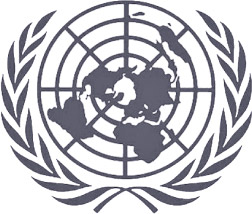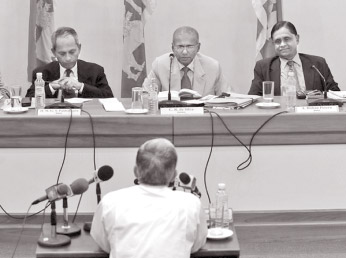Understanding continuing governmental diffidence
 At the recent discussion held at the Marga Institute on
accountability and reconciliation, I was confronted with an accusation I
found interesting, and not entirely groundless. One of the brighter
individuals earlier involved in advocacy NGO work suggested that my
explanations for some responses of government were similar to what was
claimed in mitigation by those who refused to criticize the LTTE when it
was intransigent in discussion and continued to engage in terrorist
activity. At the recent discussion held at the Marga Institute on
accountability and reconciliation, I was confronted with an accusation I
found interesting, and not entirely groundless. One of the brighter
individuals earlier involved in advocacy NGO work suggested that my
explanations for some responses of government were similar to what was
claimed in mitigation by those who refused to criticize the LTTE when it
was intransigent in discussion and continued to engage in terrorist
activity.
 I think there are differences, not least because I have drawn
attention to governmental lapses in various areas, while also arguing
that, while one should understand why government hesitates to move
forward on issues that would contribute to reconciliation, one should
nevertheless point out the need to move. As a distinguished Indian
diplomat put it when talking about his government’s support for
terrorist groups in the eighties, one can understand why this was
forthcoming, but that does not justify it. That is why I will continue
to point out the need for government to develop better mechanisms of
consultation of the people in the North, as well as sensitivity to their
concerns. I think there are differences, not least because I have drawn
attention to governmental lapses in various areas, while also arguing
that, while one should understand why government hesitates to move
forward on issues that would contribute to reconciliation, one should
nevertheless point out the need to move. As a distinguished Indian
diplomat put it when talking about his government’s support for
terrorist groups in the eighties, one can understand why this was
forthcoming, but that does not justify it. That is why I will continue
to point out the need for government to develop better mechanisms of
consultation of the people in the North, as well as sensitivity to their
concerns.
Political decisions
But it is true that I can understand why government feels so
diffident, and that is why I believe it is necessary for those who are
contributing to the insecurity government feels to also mend their ways.
The apologists for the LTTE would point out how Tamils had suffered in
the past not only because of majoritarian political decisions but also
because of waves of violence that government had unleashed, or at least
not actively discouraged. Their argument was that one had to indulge the
LTTE because of the distrust they felt.
But such distrust could not be a continuing excuse in the nineties
when successive governments were bending over backwards to negotiate
with the LTTE, and all those excesses were firmly in the past.
Admittedly the violence in Dambulla and the recent attack on Fashion Bug
make one wonder whether there might not be a danger of some problems of
the eighties recurring, but from the time when J R Jayewardene broke
with Cyril Mathew, it was clear that government would not permit such
violence against Tamils.
International community
The situation is quite different now with regard to the threats
government feels it is confronted with. But since this might not be
clear, it would make sense to put down systematically how what I believe
was the original positive approach of government – something the LTTE
never evinced in all its discussions – was diverted by what it saw as
relentless persecution by some elements in the international community.
The fact that these were influenced as much by the demands of
electorally powerful elements in the diaspora as by other considerations
made their approach the more worrying.
|

One of the LLRC sittings |
In the first place, it was a grave mistake on the part of several
countries to fail to register the fact that Sri Lanka had suffered badly
from terrorism over several decades and that the achievement of the
Rajapaksa government of 2005-2010 in eradicating terrorism was timely.
President Rajapaksa and his officials deserve credit for this, and the
country will continue to give this, regardless of cavils elsewhere.
Accepting this fact would have given greater credibility to advocacy
for moving more quickly on Reconciliation and the development both of
livelihoods for those who had suffered in the war, and of better
consultation mechanisms to ensure their fuller participation in the
political, social and economic life of the country.
Those who are concerned about these factors must study how the
initial efforts of President Rajapaksa and his team to restore normality
in the North and resettle displaced civilians swiftly were resisted by
former Army Commander Sarath Fonseka, as mentioned in his letter of
resignation. Thus the subsequent support given to the Sarath Fonseka
candidacy for the Presidency suggested a mindset implacably opposed to
the government among those who claimed their main purpose was
Reconciliation based on better conditions for the Tamil people.
It is conceivable that some of those who supported the Fonseka
candidacy may have had positive motives, namely to apply pressure on the
President to move towards consensual nation building. But this was a
severe miscalculation since it led to the President relying on the
support of those who might otherwise be thought to have been the natural
constituency of a hardliner candidate.
Human rights shortcomings
The support they gave the President seemed a crucial factor then in
ensuring the thorough defeat of the common opposition candidate. But
while the gratitude of the President to those who stood by him at a
difficult time must be understood, it was a pity that this contributed
to his original plans, as exemplified in the swift resettlement of the
displaced and the swift rehabilitation of former cadres, being
superseded by less regard for minority concerns and greater stress on
security considerations.
While minority concerns require greater attention, those concerned
primarily with these should recognize the contribution to the current
concern with security of the Sri Lankan government of those in the
international community who continued to give importance to former
terrorist supporters resident in the West – unlike India which always
stood firm against such organizations.
Thus obvious double standards with regard to alleged war crimes, and
selective targeting of Sri Lanka, militate against both Reconciliation
and acceptable criticism of human rights shortcomings that should be
addressed without unsubstantiated generalizations.
So too, whilst there was a generally positive response to the Report
of the Lessons Learnt and Reconciliation Commission, including in
countries that had previously been very critical, the predominantly
negative reaction of both the main Tamil Opposition party and the State
Department of the United States precipitated negative reactions also
within government. This has complicated what should have been clear
progress because it leaves open the possibility that more will always be
demanded. If Reconciliation is to be achieved however, what seem
continuing threats must be abandoned, with stress rather on future
progress. |





